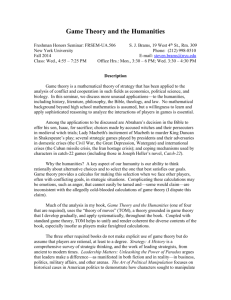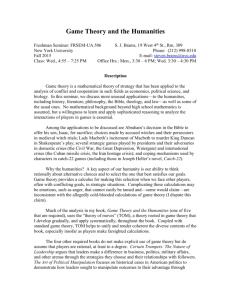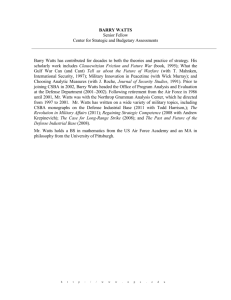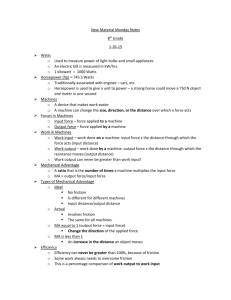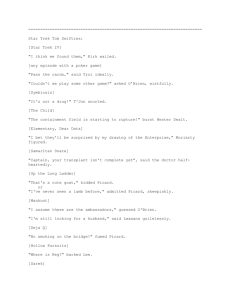political engineering: the design of institutions
advertisement
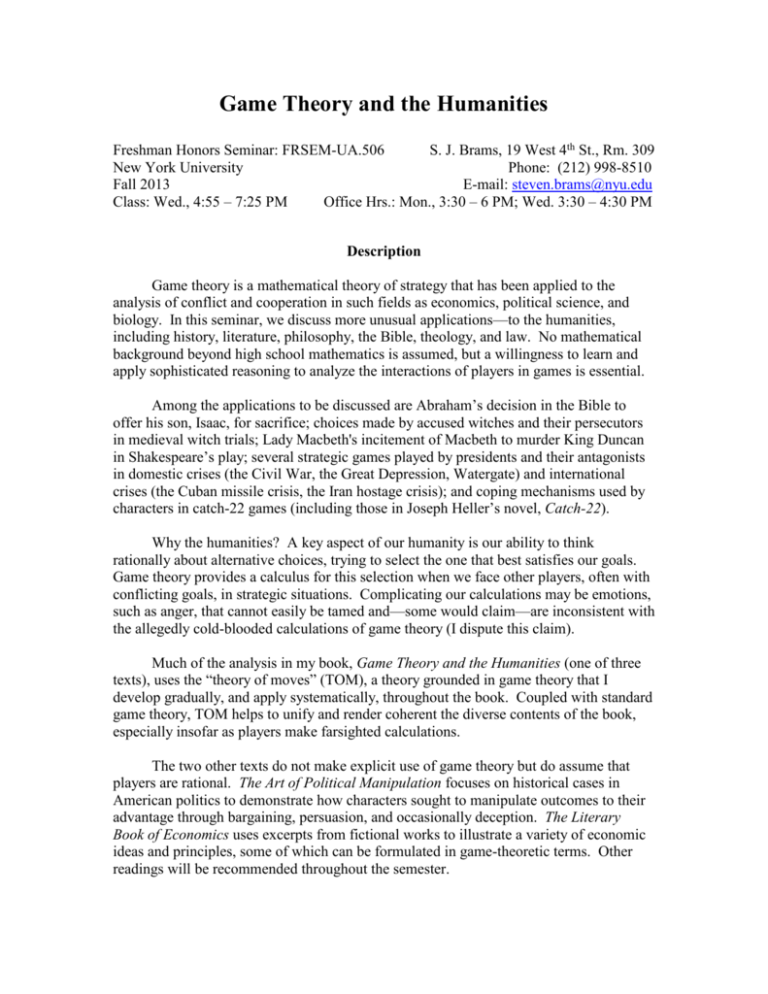
Game Theory and the Humanities Freshman Honors Seminar: FRSEM-UA.506 S. J. Brams, 19 West 4th St., Rm. 309 New York University Phone: (212) 998-8510 Fall 2013 E-mail: steven.brams@nyu.edu Class: Wed., 4:55 – 7:25 PM Office Hrs.: Mon., 3:30 – 6 PM; Wed. 3:30 – 4:30 PM Description Game theory is a mathematical theory of strategy that has been applied to the analysis of conflict and cooperation in such fields as economics, political science, and biology. In this seminar, we discuss more unusual applications—to the humanities, including history, literature, philosophy, the Bible, theology, and law. No mathematical background beyond high school mathematics is assumed, but a willingness to learn and apply sophisticated reasoning to analyze the interactions of players in games is essential. Among the applications to be discussed are Abraham’s decision in the Bible to offer his son, Isaac, for sacrifice; choices made by accused witches and their persecutors in medieval witch trials; Lady Macbeth's incitement of Macbeth to murder King Duncan in Shakespeare’s play; several strategic games played by presidents and their antagonists in domestic crises (the Civil War, the Great Depression, Watergate) and international crises (the Cuban missile crisis, the Iran hostage crisis); and coping mechanisms used by characters in catch-22 games (including those in Joseph Heller’s novel, Catch-22). Why the humanities? A key aspect of our humanity is our ability to think rationally about alternative choices, trying to select the one that best satisfies our goals. Game theory provides a calculus for this selection when we face other players, often with conflicting goals, in strategic situations. Complicating our calculations may be emotions, such as anger, that cannot easily be tamed and—some would claim—are inconsistent with the allegedly cold-blooded calculations of game theory (I dispute this claim). Much of the analysis in my book, Game Theory and the Humanities (one of three texts), uses the “theory of moves” (TOM), a theory grounded in game theory that I develop gradually, and apply systematically, throughout the book. Coupled with standard game theory, TOM helps to unify and render coherent the diverse contents of the book, especially insofar as players make farsighted calculations. The two other texts do not make explicit use of game theory but do assume that players are rational. The Art of Political Manipulation focuses on historical cases in American politics to demonstrate how characters sought to manipulate outcomes to their advantage through bargaining, persuasion, and occasionally deception. The Literary Book of Economics uses excerpts from fictional works to illustrate a variety of economic ideas and principles, some of which can be formulated in game-theoretic terms. Other readings will be recommended throughout the semester. 2 Requirements There will be reading assignments from each of the three books over the course of the semester. I will discuss the more technical aspects of the readings, but much of the class will be devoted to a class discussion. This discussion will be guided by short written comments that students are required to submit about each week’s readings. After the first few weeks of the seminar, students will be asked to submit short essays, and make brief oral presentations, on topics they wish to explore in greater depth. A longer term paper, developed in consultation with the instructor, will be due at the end of the semester. Students will be graded on the basis of their written work, their oral participation and presentations, and possible quizzes or exams Required Books Brams, Steven J. (2011). Game Theory and the Humanities: Bridging Two Worlds. Cambridge, MA: MIT Press. Paperback. Riker, William H. (1986). The Art of Political Manipulation. New Haven, CT: Yale University Press. Paperback. Watts, Michael (ed.) (2003). The Literary Book of Economics. Wilmington, DE: ISI Books. Hardcover. Assignments Due Sept: 4 Sept. 11 Sept 18: Sept. 25: Oct. 2: Oct 9: Oct. 16: Oct. 23: Oct. 30: Nov. 6: Nov. 13: Nov. 20: Nov. 27: Dec. 4: Dec. 11: Brams, ch. 1; Riker, ch. 1; Watts, A & B Brams, ch. 2; Riker, ch. 2; Watts, C & D Brams, ch. 3; Riker, ch. 3; Watts, E & F Brams, ch. 4; Riker, ch. 4; Watts, G & H Brams, ch. 5; Riker, ch. 5; Watts, I, J, & K Brams, ch. 6; Riker, ch. 6; Watts, L & M Brams, ch. 7; Riker, ch. 7; Watts, N, O, & P Preliminary Presentations Brams, ch. 8; Riker 8, ch. 8; Watts, Q & R Brams, ch. 9; Riker, ch. 9; Watts, Epilogue & Appendices Brams, ch. 10; Riker, ch. 10 Brams, ch. 11; Riker, ch. 11 Riker, ch. 12 & Conclusions Paper presentations Paper presentations 3 Selective Bibliography (Books Not Cited in Game Theory and the Humanities) Abramson, Paul R. (2012). Politics in the Bible. Transaction Publishers. Alulis, Joseph, and Vickie Sullivan (eds.) (1996). Shakepeare’s Political Pageant: Essays in Politics & Literature. Rowman and Littlefield. Baird, Douglas G., Roobert H. Gertner, and Randal C. Picker (1994). Game Theory and the Law. Harvard University Press. Bloom, Allan, with Harry V. Jaffa (1981). Shakespeare’s Politics. University of Chicago Press. Bokina, John (1997). Opera and Politics: From Monteverdi to Henze. Yale University Press. Boorman, Scott A. (1969). The Protracted Game: A Wei-Ch’i Interpretation of Maoist Revolutionary Strategy. Oxford University Press. Chwe, Michael Suk-Young (2013). Jane Austen, Game Theorist. Princeton University Press. Cohen, Raymond (1987). Theatre of Power: The Art of Diplomatic Signalling. Longman House. Cowley, Robert (ed.) (1999). What If? The World’s Foremost Military Historians Imagine What Might Have Been. G. P. Putnam’s Sons. Cowley, Robert (ed.) ((2001). What If 2? Eminent Historians Imagine What Might Have Been. G. P. Putnam’s Sons. Ellickson, Robert C. (1991). Order without Law: How Neighbors Settle Disputes. Harvard University Press. Katz, Leo (2011). Why the Law Is So Perverse. University of Chicago Press. Luttwak, Edward N. (1987). Strategy: The Logic of War and Peace. Harvard University Press. Seymour, William (1982). Yours to Reason Why: Decisions in Battle. De Capo Press. Whitebrook, Maureeen (ed.) (1992). Reading Political Stories: Representations of Politics in Novels and Pictures. Rowman and Littlefield.
